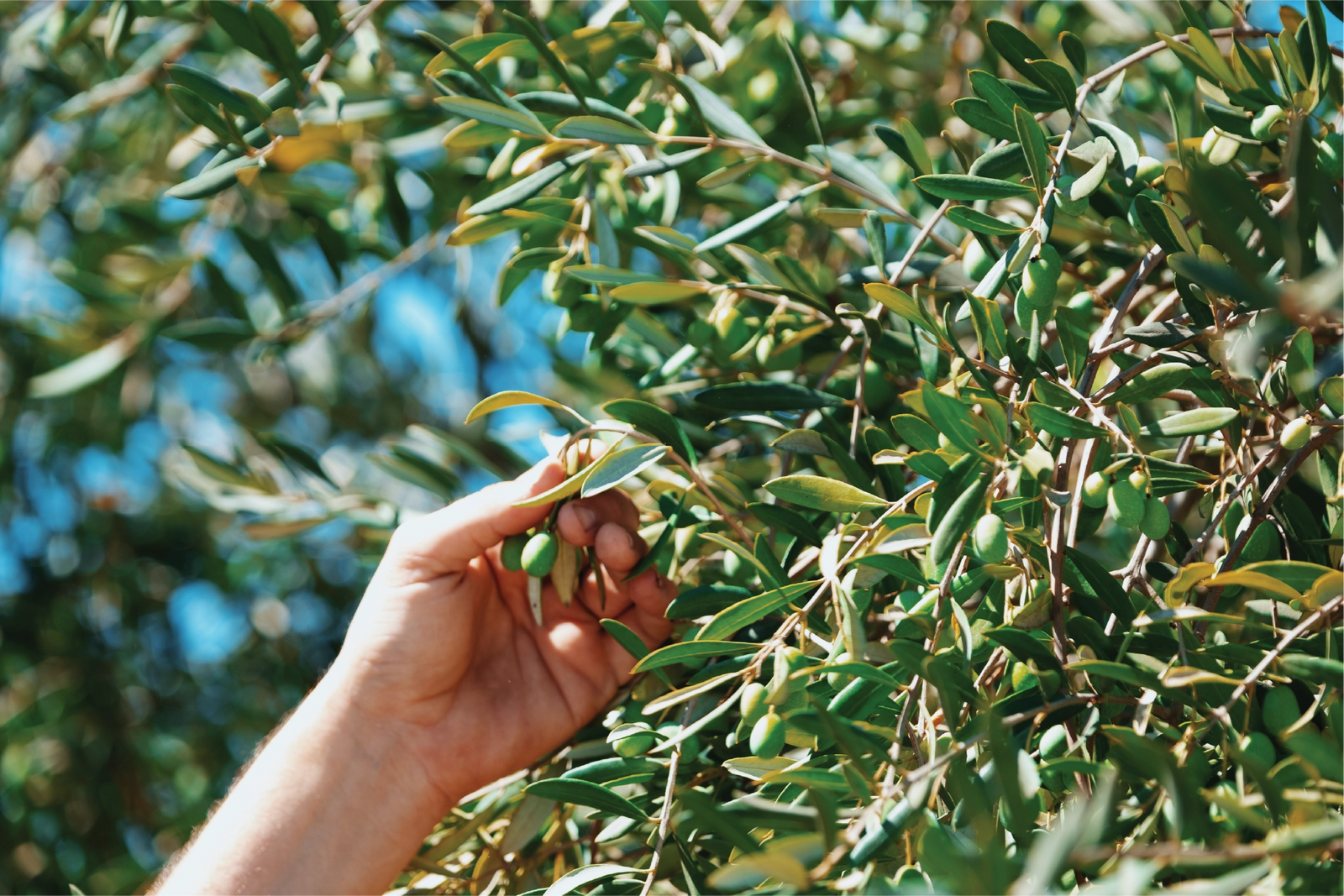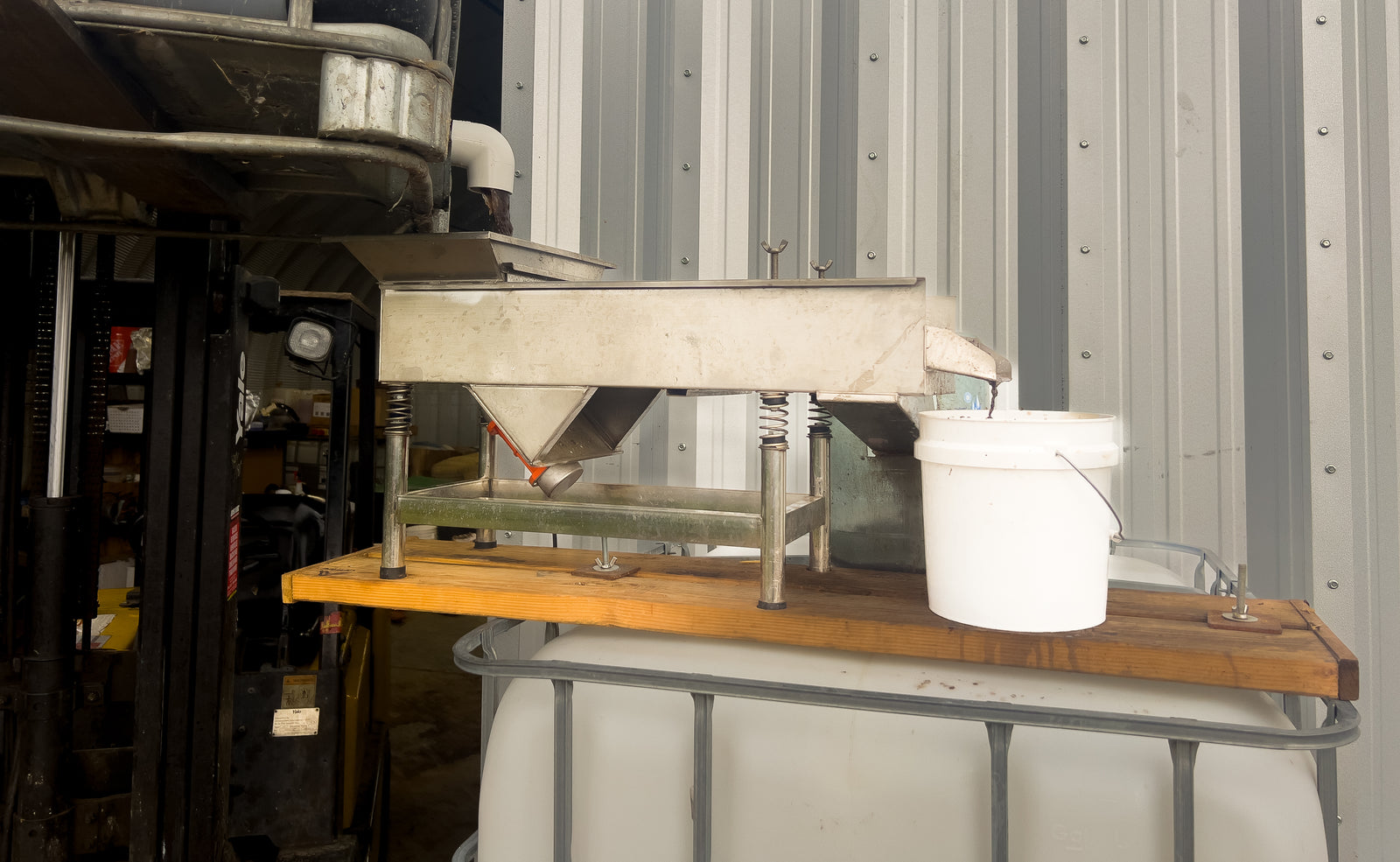Introduction to Regenerative Agriculture
We've spent years studying the various schools of thought that comprise Regenerative Agriculture. In this time, we have developed and implemented a number of techniques on farm to restore soil health, revitalize our crops health, and produce higher quality oil with fewer inputs. Below you will find both theory and practical how to guides outlining the techniques and recipes we've developed.
Although we have only begun to realize the promise of regenerative agriculture, we have seen a remarkable improvement in the vigor and vitality of our orchard. Primarily, we have struggled with Venturia oleaginea (Peacock Spot) and Fusarium, with some localized Xylella and Pseudomonas savastanoi (Olive Knot). Even after one season of implementing these ideas we have seen a remarkable improvement - notably we were able to completely eliminate the spread of peacock spot onto our new tissue growth during the 2023 growing season. Additionally, the trees infected with Fusarium looked to be on their last legs, with almost all of their canopy dead and extremely stunted new growth. This year they are coming back with much healthier looking foliage and the promise of soon returning to productivity.
Why Regenerative Agriculture?
Conventional Agriculture: A Costly Path Conventional farming practices have led us down a precarious path, characterized by escalating costs, severe soil degradation, increased carbon emissions, and adverse effects both upstream and downstream. This unsustainable trajectory not only compromises our food security but also the health of our planet.
The Promise of Regenerative Agriculture In stark contrast, regenerative agriculture emerges as a powerful solution, promising reduced costs, the restoration of soil health, significant carbon sequestration, and overall improved environmental and human health. It's a philosophy and practice that seeks not just to minimize harm, but to actively improve our ecological systems.
Beyond Organic: The Regenerative Difference While organic agriculture avoids synthetic inputs, regenerative agriculture goes further, focusing on soil health, ecosystem biodiversity, and ecological balance. It's an approach that heals the land, creating systems that are resilient and abundant.
Diverse Schools of Thought Regenerative agriculture is a tapestry woven from various schools of thought, each contributing unique perspectives and techniques. From the holistic management principles that integrate livestock, crops, and nature into a cohesive system, to the modern advancements in soil science; from Korean Natural Farming (KNF) that harnesses indigenous microorganisms, to the ancient wisdom of Biodynamics that views the farm as a living organism—each school offers a piece of the puzzle in our quest for regeneration.
Through this portal, we invite you to explore an array of blogs that delve into these concepts further, offering insights into the transformative power of regenerative agriculture. Join us as we unravel the practices, tools, and preparations integral to nurturing our land back to health, ensuring a thriving planet for generations to come.
Principles of Regenerative Ag
There is no "right way" to practice regenerative ag; however there are some guiding principles and a number of ideologies that people use to approach the subject.
If you are new to the subject, I would recommend starting here to better understand the context of the recipes and techniques below.
- The Soil Health Principles - The "North Star" of regenerative ag, if you ever find yourself lost on the journey, this is where to look for guidance and direction. Everything that follows on this page is a derivation of these principles.
- Holistic Management Approach - Holistic Management is what we think of when we imagine "organic". This approach forms the basis for most other schools of thought.
- The Nutrition Based Approach - Using modern techniques, like Sap Analysis, we can fast track the recovery of our soils and grow crops that are resistant to pests and disease. Coming Soon!
- Korean Natural Farming - Developed by Cho Han Kyu in Korea in the 1960's. This approach focuses on collecting Indiginous Micro Organisms (IMO) from well developed ecosystems, and culturing them on farm to restore microbial diversity. Coming Soon!
- Biodynamics - Developed by Rudolf Steiner in the early 20th century. Although many are turned off by biodynamics focus on mystical energy and the influence of astrology, no discussion of ecological farming would be complete without paying respects to this school of thought. Coming Soon!
Recipes & Techniques:
In our studies, we saw many schools of thought and belived all had a part to play. We have
Tools & Practices
- Sap Analysis - Monitoring Crop Health In Real Time. Coming Soon!
- Microbe Brewing Tanks - Multiply Your Own Microbes For Better Crop Performance, and Pest & Disease Resistance. Coming Soon!
- Evapotranspiration - Model Your Crop's Irrigation Needs For Water Saving & Improved Performance. Coming Soon!
- Vibrating Filter - A Necessity When Handling Low Cost Inputs. Coming Soon!
- How To Design A Foliar Spray - Developing A Foliar Spray To Maximize Uptake And Plant Resopnse. Coming Soon!
- Seed Treatment - Give Your Crop A Leg Up Out Of The Gate. Coming Soon!
Mineral Chelates:
- Calcium Citrate/Acetate - Strengthening Plant Structure & Enhancing Nutrient Uptake For Robust Growth. Coming Soon!
- Potassium Citrate/Acetate - Optimizing Water Usage & Stomatal Function For Improved Drought Resistance. Coming Soon!
- Boron Fulvate - Crucial For Pollination & Seed Production, Ensuring Crop Fertility. Coming Soon!
- Copper Citrate - Supporting Essential Plant Enzyme Systems For Disease Resistance & Vigor. Coming Soon!
- Iron Citrate - Fundamental For Chlorophyll Synthesis & Energy Transfer, Boosting Photosynthesis. Coming Soon!
- Manganese Citrate - Vital For Metabolism & Antioxidant Systems, Enhancing Stress Tolerance. Coming Soon!
- Zinc Citrate - Key For Growth Hormone Production & Internodal Elongation, Promoting Healthy Development. Coming Soon!
Biological Preparations:
- Compost Tea - Enhancing Soil Biology & Plant Immunity With Rich Microbial Diversity. Coming Soon!
- KNF Liquid IMOs (Indigenous Micro Organisms) - Leveraging Local Microbial Communities For Soil Health & Plant Resilience. Coming Soon!
- Consortium of Specialty Microbes - Tailored Microbial Solutions For Specific Crop Needs, Boosting Yield & Health. Coming Soon!
- Anaerobic Microbe Blend - Stimulating Root Zones & Soil Structure With Dynamic Anaerobic Processes. Coming Soon!
- Compost Extract - Delivering Concentrated Soil Microbes & Nutrients For Immediate Plant Availability. Coming Soon!

Korean Natural Farming:
- IMO 1 (Indigenous Microorganisms 1) - Capturing & Cultivating Local Microbial Life To Enrich Soil Biodiversity. Coming Soon!
- IMO 2 - Mixing Captured Microbes With Sugar To Stabilize & Store Biological Diversity. Coming Soon!
- IMO 3 - Integrating Microbes Into Soil With Organic Matter To Build Fertility & Structure. Coming Soon!
- Rice/Milk Starter - Creating Beneficial Yeast & Lactic Acid Bacteria Cultures For Soil & Plant Health. Coming Soon!
- KNF Liquid IMOs - Applying Liquid Indigenous Microorganisms To Activate Soil & Promote Growth. Coming Soon!
- Anaerobic Microbe Blend - Utilizing Fermentation To Release Nutrients & Enhance Microbial Activity. Coming Soon!
Plant Growth Stimulant/Biodynamic(ish) Preparations:
- Fermented Plant Extract - Unlocking Plant Nutrients & Hormones For Growth Stimulation & Enhanced Resistance. Coming Soon!
- Kelp Extract - Concentrated Sea Minerals & Growth Promoters For Vigor & Stress Tolerance. Coming Soon!
- Alium Zingiber Brew - A Potent Mix Of Garlic & Ginger Extracts To Boost Plant Immune Systems & Drive Quality. Coming Soon!
- Beeswax Triacontanol - A Natural Wax-Coated Leaf Surface Stimulant For Photosynthesis & Growth Efficiency. Coming Soon!
Input Preparations:
- Liquid Fulvic - Enhancing Nutrient Absorption & Transportation In Plants For Improved Metabolism. Coming Soon!
- Liquid Humic - Stimulating Soil Microbial Life & Improving Soil Structure For Root Development. Coming Soon!
- Molasses Vinegar - A Low Cost Source Of Acetic Acid, Used For Removing Carbonate Groups and Solubilizing Ca (Calcium) In Lime, or K (Potassium) In Sunflower Hull Ash. Coming Soon!





